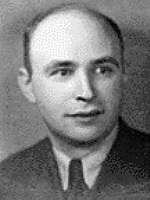Gustav Bergmann
Gustav Bergmann | |
|---|---|
 | |
| Born | 4 May 1906 |
| Died | 21 April 1987 (aged 80) Iowa City, U.S. |
| Alma mater | University of Vienna |
| Era | 20th-century philosophy |
| Region | Western philosophy |
| School | Analytic philosophy Vienna Circle Logical positivism (1950s) Metaphysical realism (1960s)[1] |
| Institutions | University of Iowa |
Main interests | Philosophy of science |
Notable ideas | Coining the term "linguistic turn"[2] |
Gustav Bergmann (May 4, 1906 – April 21, 1987) was an Austrian-born American philosopher. He studied at the University of Vienna and was a member of the Vienna Circle. Bergmann was influenced by the philosophers Moritz Schlick, Friedrich Waismann, and Rudolf Carnap, who were members of the Circle.[3] In the United States, he was a professor of philosophy and psychology at the University of Iowa.
Biography
[edit]Bergmann was born in Vienna, Austria-Hungary. He earned his Ph.D. in mathematics at the University of Vienna in 1928. His dissertation, directed by Walther Mayer, was titled Zwei Beiträge zur mehrdimensionalen Differentialgeometrie. While studying for his doctorate, he was invited to join the Vienna Circle, a group of philosophers, mathematicians, scientists, and others committed to a scientific worldview under the name of logical positivism. In 1930–31, he worked with Albert Einstein in Berlin. Unable as a Jew to find academic employment, Bergmann obtained a J.D. degree from the University of Vienna in 1935, and practiced corporate law until he and his family fled to the United States in 1938. Settling at the University of Iowa in Iowa City in 1939, Bergmann eventually became professor of both philosophy and psychology.
He died in Iowa City.
Bibliography
[edit]- The Metaphysics of Logical Positivism. New York: Longmans, Green & Co. 1954. (Second edition: Madison, University of Wisconsin Press, 1967.)
- Philosophy of Science. Madison: University of Wisconsin Press 1957.
- Meaning and Existence. Madison: University of Wisconsin Press 1959.
- Logic and Reality. Madison: University of Wisconsin Press 1964.
- Realism: A Critique of Brentano and Meinong. Madison: University of Wisconsin Press 1967.
- New Foundations of Ontology. Madison: University of Wisconsin Press 1992. Edited by William Heald.
- Collected Works. Vol I. II. Frankfurt am Main: Ontos Verlag 2003.
See also
[edit]References
[edit]- ^ "The Ontological Realism of Gustav Bergmann" (Ontology: Theory and History)
- ^ Neil Gross, Richard Rorty: The Making of an American Philosopher, University Of Chicago Press, 2008, p. xxix.
- ^ "Gustav Bergmann" (clas.uiowa.edu)
References
[edit]- Ontology and Analysis: Essays and Recollections about Gustav Bergmann, edited by Laird Addis, Greg Jesson, and Erwin Tegtmeier, Frankfurt: Ontos Verlag, 2007.
- Fostering the Ontological Turn: Gustav Bergmann (1906–1987), edited by Rosaria Egidi and Guido Bonino, Frankfurt: Ontos Verlag, 2008.
- Gustav Bergmann: Phenomenological Realism and Dialectical Ontology, edited by Bruno Langlet and Jean-Maurice Monnoyer, Frankfurt: Ontos Verlag, 2009.
- The Ontological Turn: Studies in the Philosophy of Gustav Bergmann, edited by Moltke Gram and Elmer Klemke, Iowa City: University of Iowa Press, 1974.
- The Positivist and the Ontologist: Bergmann, Carnap, and Logical Realism, by Herbert Hochberg, Amsterdam: Rodopi, 2001.
External links
[edit]- 1906 births
- 1987 deaths
- 20th-century American lawyers
- 20th-century American philosophers
- 20th-century American male writers
- 20th-century American non-fiction writers
- 20th-century Austrian lawyers
- American male non-fiction writers
- Jewish emigrants from Austria after the Anschluss to the United States
- Analytic philosophers
- Austrian Jews
- Austrian male writers
- Austrian philosophers
- Jewish American academics
- Jewish philosophers
- Linguistic turn
- Ontologists
- Philosophers from Iowa
- Philosophers of science
- University of Iowa faculty
- University of Vienna alumni
- Vienna Circle
- Writers from Vienna
